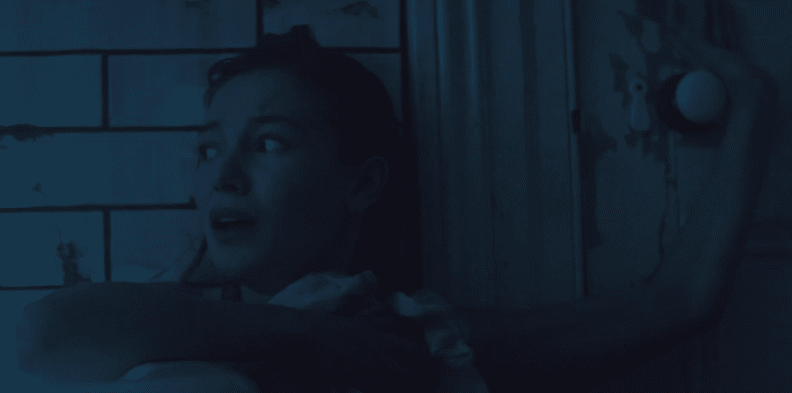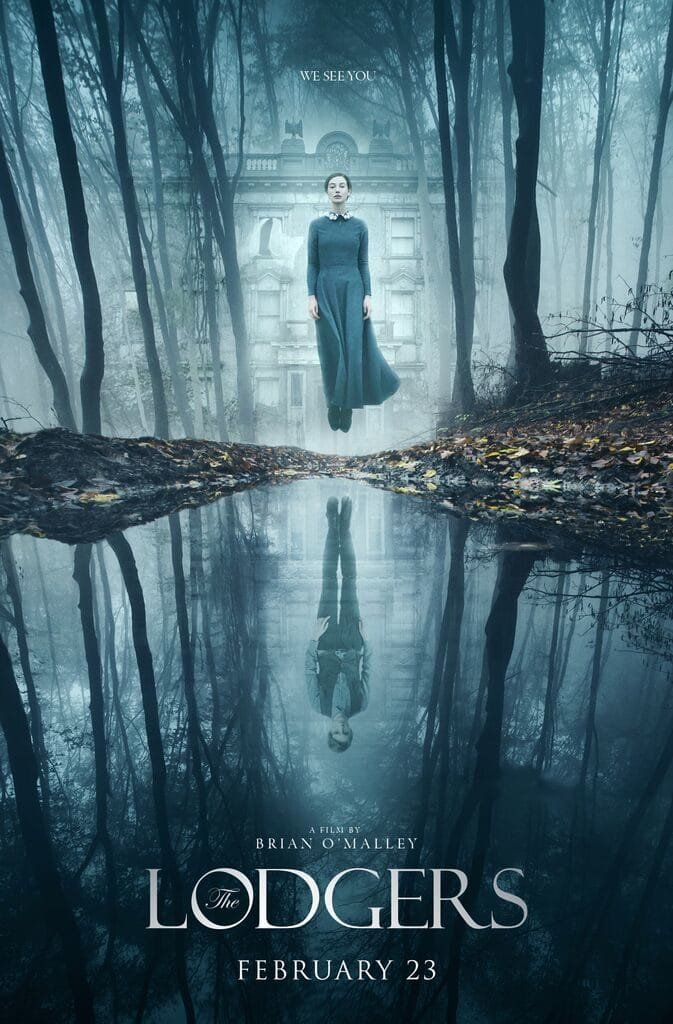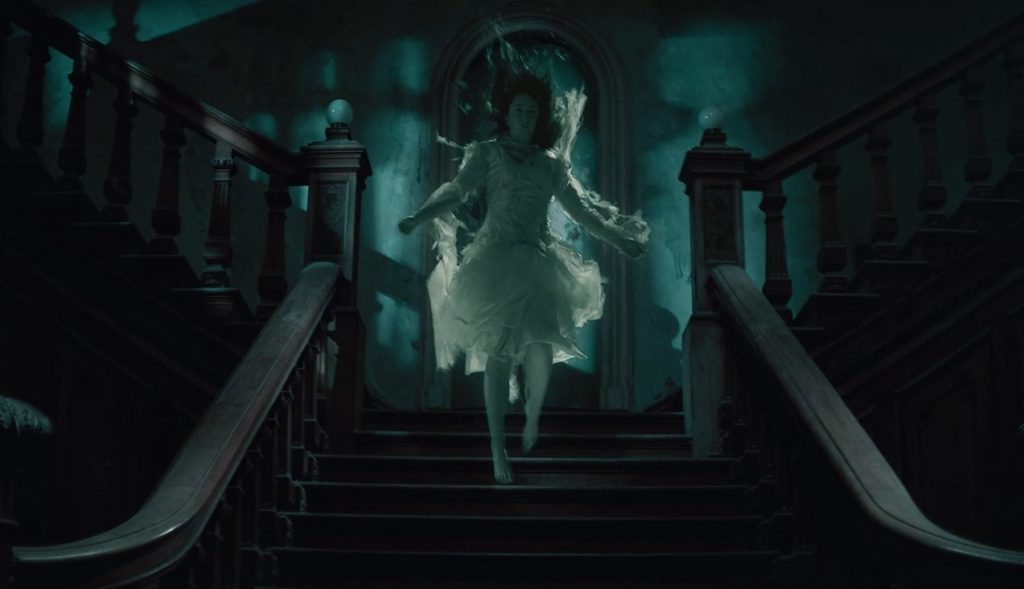 The very opening scenes of The Lodgers speak to the key themes of the film as a whole: a young woman, sitting alone by a lake at night, preoccupied by her thoughts, suddenly flees back to a dilapidated mansion house when she hears the clock striking midnight. This is the first, but not the last nod to the darker side of fairy stories; stories which the film references in abundance. Especial menace surrounds a trapdoor in the house, which bubbles and threatens with dark water as the girl returns; there are sinister forces at work here, and the girl is obviously terrified.
The very opening scenes of The Lodgers speak to the key themes of the film as a whole: a young woman, sitting alone by a lake at night, preoccupied by her thoughts, suddenly flees back to a dilapidated mansion house when she hears the clock striking midnight. This is the first, but not the last nod to the darker side of fairy stories; stories which the film references in abundance. Especial menace surrounds a trapdoor in the house, which bubbles and threatens with dark water as the girl returns; there are sinister forces at work here, and the girl is obviously terrified.
“Love can be worse than hatred.”
The girl is Rachel (Charlotte Vega) and she lives alone with her twin brother, the sickly Edward (Bill Milner). The year is 1920, and they are the orphans of a family of English descent, although they live in the crumbling family estate in rural Ireland. Aside from the obvious physical isolation they’re in from the nearby village and its inhabitants, the house has some sort of control over them which will only gradually come to light, but it’s clear that whatever this presence is, it makes the brother and sister live under a series of rules. Flouting the rules causes rising anger; being outside at midnight is one way to flout the rules, and each transgression seems to make the presence in the house manifest more clearly.
 Meanwhile, an Irishman who has been away fighting for the British in World War One returns to the village, going home to his family business – the local grocers. This is Sean (Eugene Simon – best known as cousin Lancel from Game of Thrones, the Lannister who goes full Sparrow). His reappearance causes inevitable ripples of anger around town, coming as it does at a particularly heated time in Anglo-Irish relations; however, as his mother owns the only shop in the area, he soon meets the distinctly aloof Rachel, though his initial attraction to the girl is clear. Rachel, meanwhile, receives a letter from England which jeopardises her and her brother’s isolated existence in the house, and as her oppressive home life becomes even more unbearable, even terrifying, she no longer repels Sean’s attempts to help.
Meanwhile, an Irishman who has been away fighting for the British in World War One returns to the village, going home to his family business – the local grocers. This is Sean (Eugene Simon – best known as cousin Lancel from Game of Thrones, the Lannister who goes full Sparrow). His reappearance causes inevitable ripples of anger around town, coming as it does at a particularly heated time in Anglo-Irish relations; however, as his mother owns the only shop in the area, he soon meets the distinctly aloof Rachel, though his initial attraction to the girl is clear. Rachel, meanwhile, receives a letter from England which jeopardises her and her brother’s isolated existence in the house, and as her oppressive home life becomes even more unbearable, even terrifying, she no longer repels Sean’s attempts to help.
To say more about the plot and how it unfolds would do the film a disservice; I’ve seen some reviews note that to them the plot is unduly thin, but it seems to me that director Brian O’Malley and writer David Turpin have quite deliberately allowed the atmospherics to prevail: there’s more than enough going on here to weave a sinister story. Anything which is left unexplained works to the film’s credit; a grand exposé would unpick what comes before. What we get here is a cold, autumnal film which still simmers with a sort of aberrant sexuality, just beneath the surface. The supernatural elements exist in this repressed, dare-not state too, making people into monsters whilst personifying itself as something monstrous. This, admittedly doesn’t lead to a terrifying horror story – although there are a few sequences which effectively transform the underlying tension into something more real. Overall, this film is far closer to The Innocents than The Innkeepers. Prospective viewers take note, and please don’t kvetch if you pick this one up expecting to jump out of your skin multiple times.
If The Innocents is one prospective influence, then you might note others. From what I’ve said so far, you could infer a few similarities to Edgar Allan Poe’s short story, The Fall of the House of Usher. From Edward’s sensory over-sensitivity to the entity-like house to the brother and sister in a state of warped isolation, the links are there; again, no bad thing. I was also put in mind of The Company of Wolves in a few scenes, although the film as a whole is rooted in a modern, largely realistic setting. Something about the way the light slants through the woods, perhaps, but also the way that The Lodgers takes elements of fairy stories – the obsession with coming-of-age, beauty, sexuality, conduct, curses – and explores them in a similar way to Angela Carter/Neil Jordan. The film is also stunningly beautiful, and not a stroke of set-dressing seems to have been wasted. Shot on location in Ireland, the sets and the scenery are stunning to look at, and the period setting is meticulously realised throughout, with no spell-breaking anachronisms.
As much as there is a chain of influences at work here, The Lodgers is very much its own beast. It’s just the kind of rich, symbolic, but still subtle supernatural horror which I love, and which I wish more filmmakers were making these days. Yes, there are unanswered questions here, but this absolutely doesn’t detract from the film as a whole. And all of this is achieved without a single screeching jump-cut, either.
The Lodgers is released in US/Canadian cinemas today (23rd February 2018).
